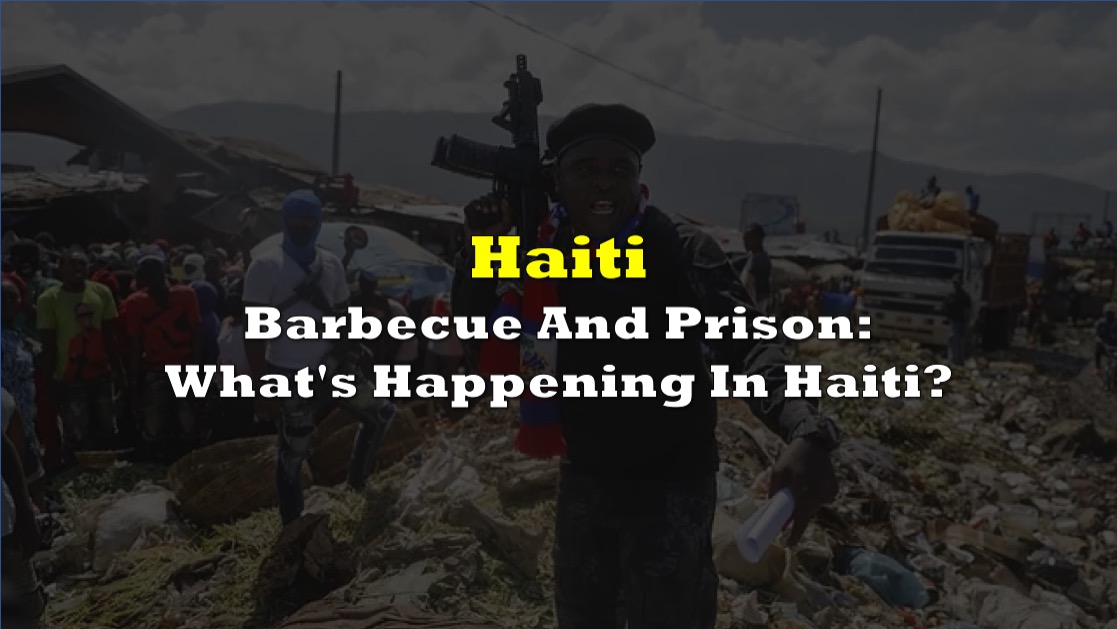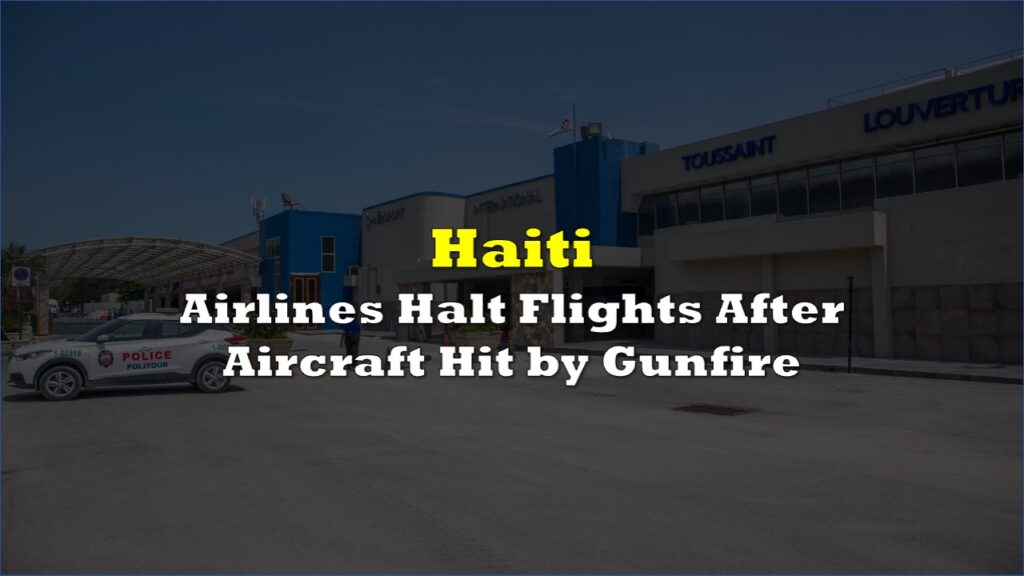Hundreds of prisoners have escaped from Haiti’s National Penitentiary in the capital, Port-au-Prince, following intense fighting that erupted on Saturday, according to a law enforcement source.
The chaos prompted a plea from one of Haiti’s Police Unions, urging all officers in the capital with access to cars and weapons to assist in maintaining control of the penitentiary. The union warned of dire consequences if the attackers succeeded, stating, “We are done. No one will be spared in the capital because there will be 3,000 extra bandits now effective,” according to the statement posted on X.
SOS pou penitansye/ gran prizon!!! @SPNH_17, Sendika Lapolis la, ap mande tout polisye ki nan kapital la swa ki gen machin, zam ak minisyon, sa yo ki nan backup VIP yo pote kole ak polisye kap goumen nan penitansye, depi nou kite bandi pran penitansye nou fini . Pèsonn pap… pic.twitter.com/x1MFTJJ1XW
— SPNH-17 ,Syndicat de la Police Nationale D'Haiti (@SPNH_17) March 3, 2024
Security sources in Port-au-Prince revealed to CNN that the recent surge in violence, which commenced on Thursday, has targeted police stations, the international airport, and the National Penitentiary, marking an unprecedented escalation in recent years.
In response to a surge in violence over the weekend, authorities have implemented a nighttime curfew in an effort to restore order on the nation’s streets. A 72-hour state of emergency commenced Sunday night, with the government pledging to pursue and apprehend the perpetrators, including killers, kidnappers, and other violent offenders, who reportedly fled from detention facilities.
Finance Minister Patrick Boivert, acting as the interim prime minister, issued a directive stating, “The police have been instructed to utilize all lawful measures to enforce the curfew and apprehend all violators.”
Barbecue
Haitian gang leader Jimmy Cherizier, also known as Barbecue, declared his intention to continue efforts to oust Prime Minister Ariel Henry. In a statement, Cherizier called on the Haitian National Police and the military to arrest Henry, emphasizing, “You arrest Ariel Henry for the country’s liberation.”
Chérizier is a prominent figure in Haiti’s criminal underworld, renowned for founding the G9 and Family (G9), a coalition of nine influential gangs based in Port-au-Prince. He has close ties with Haiti’s powerful political force, the Haitian Tèt Kale Party (PHTK), and the police. Chérizier’s criminal history traces back to his tenure as a police officer, marked by involvement in controversial operations resulting in civilian casualties.
Notably, Chérizier led a group of gangs in deadly massacres in the Grand Ravine and La Saline neighborhoods in 2017 and 2018, respectively. These massacres, among the deadliest in Haiti’s recent history, led to his dismissal from the police force and a subsequent warrant for his arrest. However, he evaded capture and orchestrated further violence, including attacks in 2019 and 2020, often with alleged support from senior government officials.
Chérizier’s influence extends beyond mere criminal activities. He has acted as a mediator within the G9, quelling internal disputes and mobilizing gangs for targeted violence. Moreover, he is believed to have facilitated ties between gangs and state officials, potentially orchestrating state-sponsored atrocities.
The former police officer has faced sanctions from the United Nations and the United States Department of Treasury.
Henry
Currently, public frustration against Henry has been mounting over his perceived inability to curb the unrest. Despite previous commitments to hold elections and transfer power by February 7, Henry failed to step down last month, citing the escalating violence.
Haiti Prime Minister Ariel Henry under heavy gang attack in Haiti. This is how political instability and rampant gang violence in Haiti looks like. Let's pray for the Kenyan police as they go there. pic.twitter.com/rcOdZzPloc
— Alinur Mohamed (@AlinurMohamed_) March 2, 2024
Caribbean leaders announced on Wednesday that Henry had agreed to hold general elections no later than August 31, 2025. However, the recent outbreak of violence coincided with Henry’s visit to Kenya to finalize details for a multinational security support mission to Haiti.
Gangs have launched multiple attacks on police stations across Port-au-Prince since Thursday, resulting in at least four deaths and the destruction of some stations. Gunfire near the airport on Thursday forced airlines to suspend flights.
🚨 Haiti 🇭🇹
— Izlamic Terrorist (@raviagrawal3) March 3, 2024
Armed groups attacked one of the most important prisons in Haiti and managed to free gang members. There are clashes with heavy weapons in the streets of Port-au-Prince. pic.twitter.com/46XwjCIpmO
The US Embassy in Haiti issued a security alert, cautioning of gunshots and traffic disruptions near the airport and surrounding areas. Haiti has been plagued by unrest and gang violence, with warring gangs controlling much of Port-au-Prince and terrorizing the population.
The recent prison break allowed an unknown number of prisoners to escape, including high-profile inmates linked to the 2021 assassination of Haitian President Jovenel Moïse.
Back in 2022, a group of Haitian law enforcement officers planned to arrest former anti-corruption official Joseph Felix Badio, suspected of involvement in Moïse’s assassination, while meeting with Henry. However, the operation failed as Badio didn’t show up, allegedly tipped off.
Multiple sources accuse Henry of obstructing the investigation and covering up his involvement. Despite evidence linking Henry to phone calls with a suspect after the assassination, he denies any wrongdoing.
The investigation has stalled under Henry’s administration, with key officials fired or silenced. Calls for Henry’s resignation persist, while the US supports an independent investigation, signaling potential involvement of American authorities in probing the case.
Last February, a judge in Haiti indicted several individuals, including the widow of Moïse, Martine Moïse, Claude Joseph, and Léon Charles, in connection with his assassination. Nearly 50 suspects were indicted, with Charles facing the most serious charges.
Meanwhile, the prime minister, a neurosurgeon by profession, has brushed aside calls for his resignation and refrained from commenting when questioned about the safety of returning home.
Kenya
The leaders of Kenya and Haiti have reached an agreement for a Kenya-led United Nations mission to be deployed to the Caribbean nation, aiming to address the escalating violence and instability.
Under the agreement, Nairobi plans to dispatch 1,000 armed personnel, referred to as police officers, to Port-au-Prince. The Biden administration has been advocating for a UN intervention in Haiti to restore order.
In October, the United Nations Security Council, at the urging of Washington, approved a resolution authorizing Kenya to lead a UN police force in Haiti. The mission’s objective is to support Henry’s government and stabilize the situation in the capital, which has been plagued by violent gangs and a lack of effective governance.
However, the decision to deploy Kenyan personnel faced challenges. Opposition leader Ekuru Aukot in Nairobi contested President William Ruto’s move, leading to a legal battle. In January, the Kenyan High Court ruled in favor of Aukot, halting the deployment.
Ruto subsequently sought an alternative route by directly negotiating with Port-au-Prince. The recent agreement, described as “reciprocal,” was signed on Friday between Ruto and Henry. While details about the operation timeline were not disclosed, both leaders expressed a commitment to expedite the deployment process.
Having spent 2 tours in Haiti, including two peacekeeping operations with U.S. forces, I sadly feel that 1,000 well intentioned policemen will be totally overwhelmed. Deadly day in Port-au-Prince with the future looking bleak. IC really needs to come up with something better. https://t.co/oUhtllvMBE
— Luis Moreno (@LuisMorenolg) March 3, 2024
Despite the efforts to address the crisis, the plan has encountered opposition from various quarters, including within Haiti. Many Haitians have expressed concerns over the history of UN peacekeeping missions in their country, citing instances of misconduct, including sexual abuses and the introduction of cholera that led to fatalities.
Critics, including the Haitian think tank Groupe de Travail sur la Securite (the Security Working Group), have raised skepticism regarding the effectiveness of the UN intervention. They argue that previous experiences have left a “bitter taste” among Haitians, with foreign forces failing to adequately address underlying issues and even exacerbating certain problems.
Information for this analysis was found via CNN, InSight Crime, RFI, Miami Herald, Zero Hedge, and the sources mentioned. The author has no securities or affiliations related to the discussed organizations. Not a recommendation to buy or sell. Always do additional research and consult a professional before purchasing a security. The author holds no licenses.





